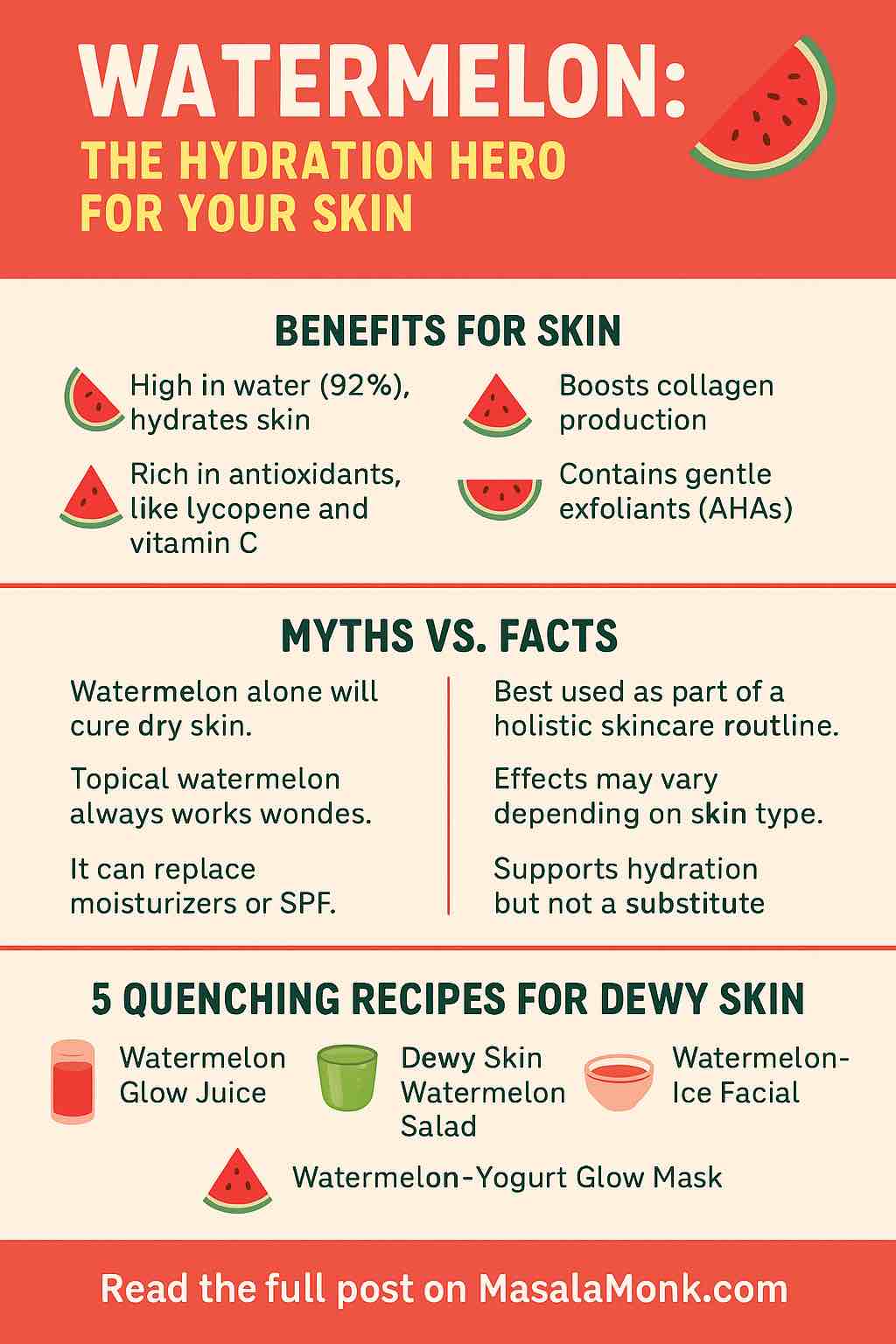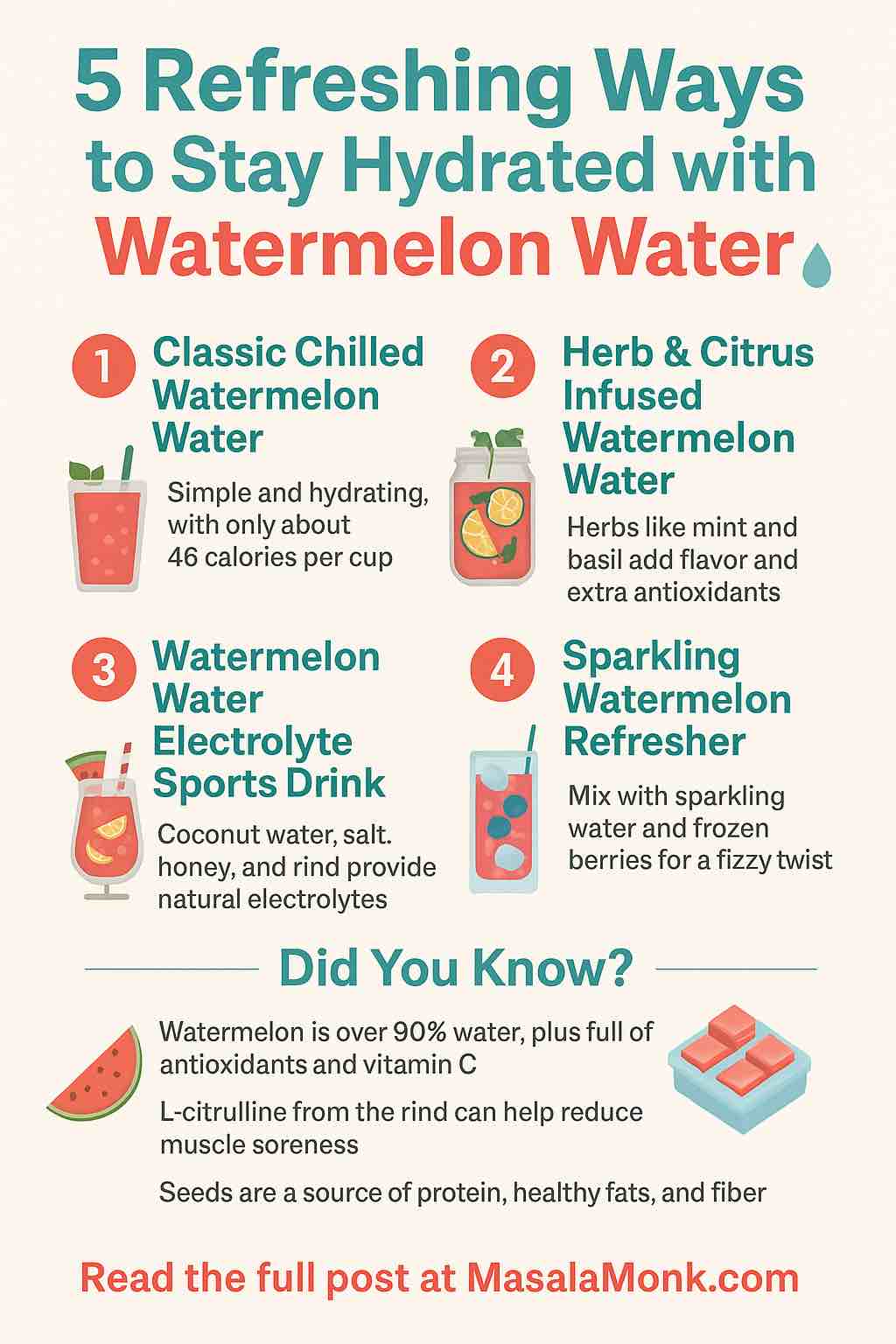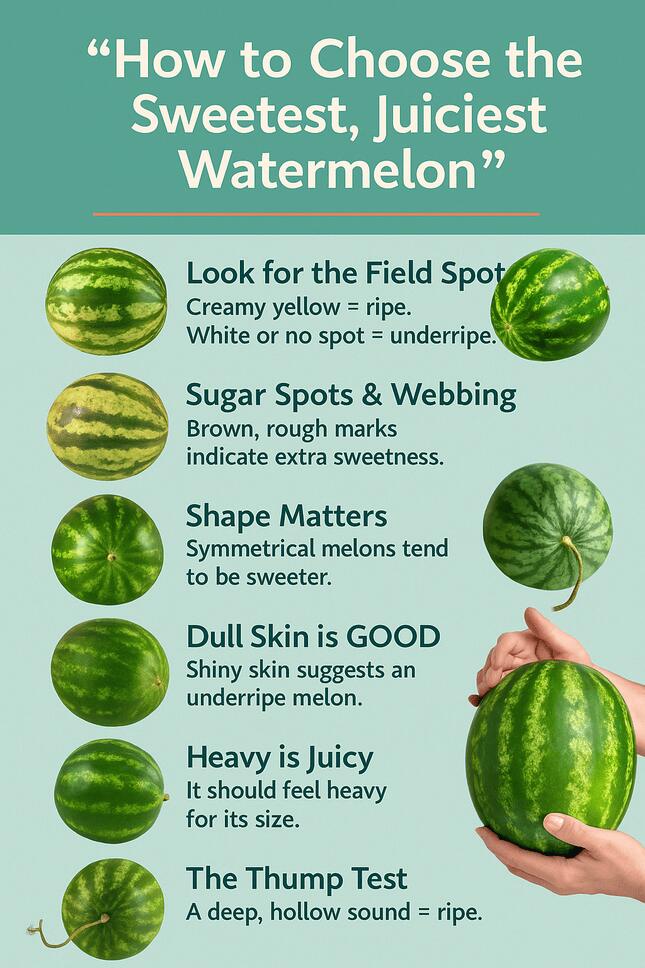
When the summer sun is blazing, nothing refreshes quite like a cold slice of watermelon. But did you know that this juicy fruit is more than just a picnic staple? Watermelon is fast becoming a darling of the skincare world—earning its stripes as the “hydration hero” for glowing, dewy skin. From antioxidant-packed flesh to nourishing seed oil and hydrating rind, watermelon works inside and out to keep your skin at its best.
But can it really deliver on all those glowing promises? Let’s dive into the science, debunk the myths, and get practical with recipes you can sip, snack on, or even slather on your skin.
Why Watermelon Is a Skin Superstar
1. Unmatched Hydration Power
Watermelon is about 92% water—making it one of nature’s most effective hydrators. Eating or drinking watermelon helps your skin stay plump and elastic, fighting off dryness and fine lines from the inside out.
2. Antioxidant Arsenal
This fruit is loaded with lycopene, vitamin C, beta-carotene, and citrulline. These antioxidants fight oxidative stress, help prevent signs of premature aging, and support skin repair.
3. Collagen Boosting
Vitamin C in watermelon is a crucial player in collagen production. More collagen means firmer, more resilient skin and faster healing from daily stressors.
4. Calms and Soothes
Watermelon naturally contains anti-inflammatory compounds, including vitamin A and citrulline, that help soothe redness and calm irritated skin.
5. Gentle Exfoliation
It also has small amounts of malic and citric acids (AHAs) which help gently exfoliate dead skin, revealing a brighter complexion.
What the Research Says
- Topical Watermelon Works:
A study found that applying watermelon juice to skin significantly boosted hydration compared to water alone. Another preclinical trial using watermelon rind extract cream improved hydration, elasticity, and sebum in skin, thanks to its potent bioactive compounds. - Internal Benefits:
Regularly eating watermelon or drinking its juice improves skin moisture and may lower oxidative stress, supporting your skin’s glow from within. - Rind and Seed Oil:
Watermelon rind has a higher phenolic and citrulline content than the flesh—making it an excellent (and often wasted) resource for topical DIY recipes. The oil from watermelon seeds (Kalahari melon oil) is rich in linoleic acid and vitamin E, supporting the skin’s barrier and locking in moisture.
Watermelon Myths—Busted
| Myth | Fact |
|---|---|
| Watermelon alone can cure dry skin. | It hydrates, but best results come with a balanced skincare and nutrition routine. |
| DIY watermelon masks are always safe. | Not everyone’s skin agrees; patch test first, especially if sensitive. |
| Watermelon can replace your moisturizer or sunscreen. | It supports hydration but doesn’t replace barrier creams or SPF. |
| Only the red flesh is useful. | The rind and seeds are skin-friendly superstars too! |
5 Quenching Watermelon Recipes for Dewy Skin
Here are five recipes—three edible, two topical—to flood your skin with hydration and nutrients.
1. Watermelon Glow Juice
Ingredients:
- 2 cups watermelon cubes
- ½ cucumber
- 1 lime, juiced
- 3-4 fresh mint leaves
Instructions:
Blend all ingredients until smooth. Strain if desired. Drink chilled for an instant skin-refreshing boost.
Why it works:
Hydrates and provides vitamin C, lycopene, and antioxidants to fight skin dullness.
2. Dewy Skin Watermelon Salad
Ingredients:
- 1 cup watermelon cubes
- ½ cup cucumber slices
- ¼ cup feta cheese (optional)
- A handful of fresh mint
- 1 tablespoon olive oil
- Juice of ½ lemon
Instructions:
Mix all ingredients in a bowl. Drizzle with olive oil and lemon juice. Eat as a hydrating snack or meal side.
Why it works:
This combo of water-rich produce and healthy fats nourishes skin from the inside out.
3. Watermelon-Aloe Skin Soother (Topical Serum)
Ingredients:
- 2 tbsp fresh watermelon juice
- 1 tbsp aloe vera gel
Instructions:
Mix and apply to clean face for 10–15 minutes. Rinse with cool water.
Why it works:
Aloe calms irritation while watermelon hydrates and soothes, perfect for post-sun or irritated skin.
4. Watermelon Ice Facial
Ingredients:
- Fresh watermelon juice
Instructions:
Pour juice into an ice cube tray and freeze. Glide a cube gently over clean skin for 30–60 seconds, then pat dry.
Why it works:
Cools, tightens pores, boosts microcirculation, and leaves your face looking instantly refreshed.
5. Watermelon-Yogurt Glow Mask
Ingredients:
- 2 tbsp watermelon puree
- 1 tbsp plain Greek yogurt
- 1 tsp honey
Instructions:
Mix and apply to your face. Leave on for 10–15 minutes, then rinse.
Why it works:
Yogurt contains lactic acid for mild exfoliation, honey adds moisture, and watermelon brings hydration and glow.
Practical Tips for Maximum Results
- Patch Test First: Always patch test new topical recipes, especially if you have sensitive skin.
- Fresh is Best: Use fresh, ripe watermelon for the highest nutrient content.
- Don’t Forget the Rind: Save and blend the white rind for even more skin benefits—especially in topical masks.
- Balance Is Key: Watermelon is wonderful, but skin health thrives with a combination of sleep, hydration, sun protection, and a nutrient-rich diet.
Takeaway
Watermelon truly is a hydration hero for your skin—inside and out. Whether you’re sipping it, snacking on it, or making a mask, you’re flooding your cells with water, antioxidants, and vital nutrients. Just remember: it’s not a cure-all, but a delicious, science-backed addition to your skincare and wellness routine.
So, next time you slice into a watermelon, think beyond the fruit bowl. Your skin will thank you!
Ready to try these recipes? Or want to learn about other food-based skin heroes? Let me know in the comments!
Frequently Asked Questions (FAQs)
1. Is watermelon good for all skin types?
Yes, watermelon is generally safe for all skin types. However, if you have sensitive or allergy-prone skin, always patch test any topical recipe before full use.
2. Can watermelon actually hydrate my skin from the inside?
Absolutely. Because watermelon is 92% water, eating or drinking it helps maintain your body’s hydration, which directly benefits skin moisture and plumpness.
3. Are watermelon-based skincare products better than DIY recipes?
Commercial products often contain stabilized and concentrated extracts for consistent results. DIY recipes are effective but may vary in potency and freshness. Use both for best results if you enjoy home remedies.
4. What are the benefits of using watermelon rind or seed oil?
The rind contains higher amounts of citrulline and phenolics, great for soothing and moisturizing skin. Seed oil is rich in linoleic acid and vitamin E, supporting the skin barrier and locking in moisture.
5. How often can I use watermelon masks or topical recipes?
2–3 times a week is safe for most people. If you have sensitive skin, start with once a week and increase as tolerated.
6. Can watermelon treat acne or just provide hydration?
Watermelon helps hydrate and soothe inflammation, which can indirectly help with acne. However, it’s not a substitute for targeted acne treatments.
7. Does eating watermelon help reduce wrinkles?
Watermelon’s antioxidants and vitamin C support collagen production and fight free radicals, which may help reduce signs of aging when combined with a healthy lifestyle.
8. Can I leave watermelon juice on my face overnight?
It’s not recommended, as watermelon is watery and can cause irritation if left too long. Rinse off topical recipes after 10–20 minutes.
9. Will watermelon lighten my skin?
There’s no strong evidence that watermelon lightens skin tone. It can brighten and even out skin by boosting hydration and gentle exfoliation.
10. Are there any side effects of using watermelon on the skin?
Side effects are rare, but mild irritation or allergic reaction can occur in sensitive individuals. Discontinue use if you notice redness, itching, or discomfort.













